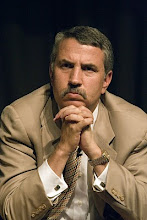As the protestors shout down Kelly, a lone pale figure dressed in tweed stands quietly.He approaches the loudest, angriest protestor and says, “I, too, abhor, police tactics that disproportionately target minorities. But you know what I abhor even more? Incivility! Have you just tried talking to Ray Kelly?”
The loud, angry protestor is taken aback. The man in tweed has touched something deep inside him. He gives one last shout, but this time it’s directed at his comrades, not the stage, “I think we should listen to what the Commissioner has to say.”
One by one, the protestors sit down. This time it’s Ray Kelly’s turn to be stunned. “You’ve taught me quite a lesson here today,” he says. “You had the power, but instead of using it to suppress me, you wielded it wisely and fairly. I had a lecture prepared but you know what, I’d rather listen to you!”
Once again, the protestors rise to recite their grievances against Kelly and the NYPD. But this time, they do in an orderly fashion. They wait in line for the microphone. They address Kelly as “sir.” They hand him pamphlets with beautiful fonts.
As Kelly listens to people tell him calmly and so respectfully how his police department has terrorized minority neighborhoods, tears stream down his face. “I cannot believe how wrong I was,” he wails.
“But we were wrong too,” say the former-protestors. “We should have put our faith in rational discourse.”
There is much weeping and hugging. Kelly announces, “I must call Mayor Bloomberg and tell him the NYPD must change immediately.”
Suddenly, Mayor Mike steps out from behind a tall plant. “You don’t have to call me, Ray-Ray. I heard the whole thing. We only have a few months left in office, but let’s reform the NYPD!”
Dedicated to Conor Friedersdorf, Katha "Weak Tea" Pollitt, and that dude who rightly reminded us that we're not Theodor Adorno.
.jpg)